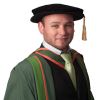
Robert Salter
- Course: Physical Chemistry PhD
- Job title: Atomic Weapons Executive
What was your area of study?
I studied physical chemistry. Most of my research was based on looking at how energy moves around in molecules. So, it was looking at how the bonds in the molecules can rotate and vibrate and how the molecules move around internally and the energy they need to make that happen. I spent most of my time looking at how the molecules with that energy get rid of it. For example a molecule with lots of energy might fall apart to give you molecules of different species or how molecules which have internal energy can collide with other molecules with less energy and transfer energy between the two. So I looked at how fast and how often those processes happen. The work has important applications in atmospheric and combustion chemistry, as well as giving insights into the mechanisms by which molecules react.
What makes you passionate about that area of research?
I am generally quite inquisitive and I have always been intrigued by how things work. I like looking at the tiny details which make up a bigger picture. The research which I have been doing is a lead-on from that. It provides very interesting problems as you can approach them with an expectation of what’s going to happen and then almost the exact opposite thing might happen. So I like trying to rationalise that and work out what is happening. So that really intrigues me, the how and the why of molecules.
Why did you decide to do a PhD then?
I did an undergraduate Masters and that spurred an interest in getting deeper into it. Physical chemistry was always the part I was most interested in. So I decided to make a career out of using my inquisitiveness to solve these types of problems.
What have you been doing since you finished your thesis?
I have been working as a post doc at Sheffield as an extension of the work I did during my PhD. I have been designing and building experiments and so all of my work is laser work and using them to look at signatures from molecules, shining light on them and watching them move around. So, I have spent a year building experiments. I am now just about to move to Reading to a permanent position working for the Atomic Weapons Executive. I found the post through my boss at Sheffield as he does some work with them.
What were the highlights of your PhD?
One of the best times was doing big conference presentation. I know that a lot of people don’t particularly like the communication of the science part of their jobs but I actually quite enjoy it. I had to do a big half an hour presentation in front of about 400 people and that was really well received which was a fantastic feeling. The other highlight has to be meeting my wife as we met while we were working here!

